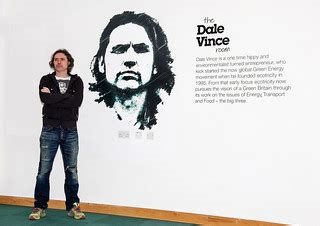Dale Vince OBE. Photo courtesy of www.flickr.com
“The greenest team in the world” is how FIFA describes League Division Two Forest Green Rovers.
In December 2012, they won first prize first prize in the sustainability and environmental category of the Institute of Groundsmanship awards for their organic pitch and the club’s environmental aspects. In 2018 they became the first football club in the world to be certified carbon neutral under the United Nations Framework Convention on Climate Change (UNFCCC) initiative Climate Neutral Now. They have also received the United Nations Environment Programme’s Momentum of Change climate action award and are the only club to have Eco-Management and Audit Scheme (EMAS) accreditation
Football clubs can have a huge impact on the environment. Keeping a pitch in top condition requires water, heating to prevent freezing, and energy-intensive lighting for grass growth. Floodlights, video screens, and scoreboards all use vast amounts of electricity, while fans travelling to and from matches emit carbon dioxide and generate huge amounts of waste.
Since Dale Vince became its owner over a decade ago, Forest Green Rovers, based in Nailsworth, Gloucestershire, has decreased its carbon footprint per spectator by 42%. Their ground, The New Lawn, is the world’s first organic football pitch. The site comprises a range of plant species and a border of native trees and is visited by wildlife from neighbouring farmland.
This has been achieved by installing solar panels on the stadium roof and linking up with 100% green energy company Ecotricity. The first robotic solar-powered lawnmower to be used in football (Mow Bot) cuts the grass, there are EV charging points for players and visitors to use and the club provides a park and ride scheme to reduce congestion and vehicle emissions.
On match days, the food is 100% vegan for staff, players and visitors alike. All waste cooking oil is recycled to make biofuel, rainwater is recycled and reused. In 2021, the team became the first in the world to play in a football kit made from a composite material consisting of recycled plastic and coffee grounds.
And what of the team’s results? Mixed, to be fair as they were promoted to league Division One last season only to bounce back down again this season. But Dale Vince is resolute in his ambition to see his team in the Championship and for this they need a larger stadium. So, plans have been passed and foundation work is underway to build one near Stonehouse, 8 miles away.

Constructed almost entirely out of wood it will be the stadium with the lowest carbon footprint in the world and form part of a new Eco Park complex alongside indoor and outdoor pitches, a new training centre, a 1,700-space car park, a hotel and a 70-bed care home.
The planned new stadium at Eco-Park. Photo courtesy of www.wired.it
There will also be around 500 trees and 1.8 km of hedgerows to promote biodiversity. And when that is all up and running, the New Lawn stadium will be demolished and carbon neutral affordable houses erected on the site.
The club does not proselytise, preferring in Dale Vince’s words to “save the world one match at a time”, but is always willing to advise other sports clubs and many have followed their example. One fan is Arsenal defender, Hector Béllerin who invested in the club, stating: “Forest Green are showing others the way. So many people feel there’s no solution to the world’s problems, but Forest Green are already doing plenty.”
 Alton Climate Action Network
Alton Climate Action Network